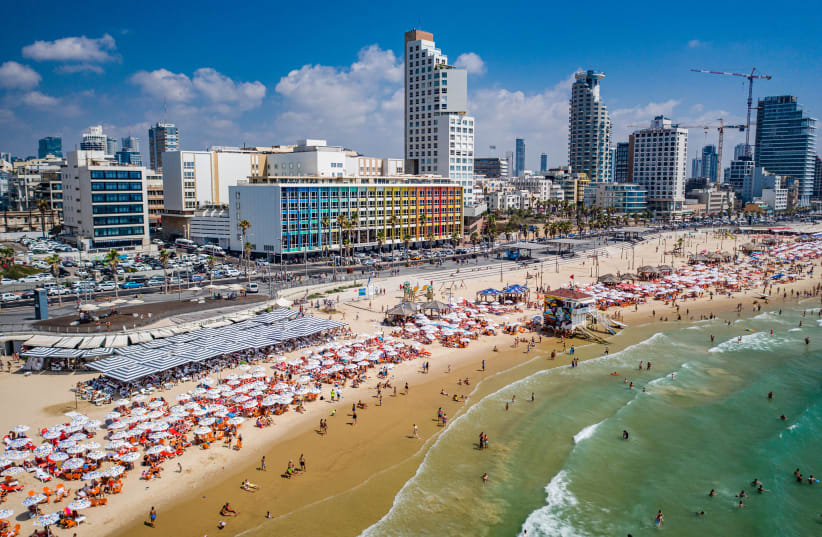Turn on the television, tune into the radio or open up the newspaper, and the impression you will get is of a country that – as it approaches its 75th birthday – is on the verge of collapse.
Rockets falling from Gaza, terrorists attacking in Tel Aviv, hundreds of thousands of demonstrators marching weekly under the flag of “Save our democracy,” reservists saying they can no longer serve their country, and more and more people talking openly about moving to Lisbon.
Even the president of the country, Isaac Herzog, said last week that Israel was within arm’s length of the abyss.
All of this leaves the impression that Israel is one unhappy place.
Except it isn’t, at least not according to the annual World Happiness Report, a product of the UN’s Sustainable Development Solutions Network. Israel’s rank on that index changed from 2021 to 2022. But contrary to what many may have imagined, the country did not go down in the Happiness Index, but instead went up.
According to this ranking of 137 countries, Israel went from being the ninth happiest country in 2021 – itself a counterintuitive achievement considering how much everyone hears everyone else in this country complain – to No. 4 in 2022.
That’s right, fourth in the world in happiness, following Finland, Denmark and Iceland, all countries whose daily headlines are not dominated by terror, threats of nuclear annihilation and a prime minister on trial for the last three years on charges of bribery, fraud and breach of trust.
Fourth in the world puts Israel well ahead of some other countries that seem to ooze happiness: places like New Zealand, Canada, France, Australia and the United States.
How can this be?
Some will argue that it can’t be. They will say that this survey was based on polling data averaged over the last three years, from 2020 to 2022, and that if you asked Israelis today to rank their level of satisfaction with life and country, the answers would be significantly different. They will argue that as a result of current developments here, Israel would now not be ranked among the world’s happiest countries, but rather among the least happy – right along with Sierra Leone, Lebanon and Afghanistan.
Except for one thing: The last three years were not exactly bumper years in the land. These were the years of the coronavirus, of multiple elections, of divisive campaign rhetoric, of a mini-war in Gaza (2021) and the start of a mini-wave of terror (2022).
And yet, despite all that – and more – Israelis still said they were quite happy with their lot. Might the answers be different today amid the judicial overhaul debate? Probably. But the data going into compiling the 2023 ranking were not collected during days that were uneventful or free of strife and contention in this country.
The study ranks countries based on respondents’ own assessments of their situation and comprehensive Gallup polling data covering six key areas: gross domestic product per capita, social support, healthy life expectancy, freedom to make life choices, generosity and absence of corruption.
The social-support category measures whether people feel they have someone to count on in times of trouble; the healthy life category includes mental health; and the generosity category centers on the question of whether people donated money to charity in the past month, with giving charity seen as a clear marker for positive community engagement.
The metrics are a mix of the objective – GDP and life expectancy – and the subjective, such as life satisfaction and the perception of corruption in the country.
Israel consistently scores high on the life-satisfaction question in these happiness surveys. This has to do with a sense of purpose and meaning that many people have living here, coupled with being close to loved ones and friends – something that often adds to overall life satisfaction.
Regarding friends and family, Israel is a country that places a high premium on both. The army often facilitates the development of exceptionally close friendships. The country’s small physical size means that family – parents, siblings, children, grandchildren, cousins – is rarely more than a three-hour drive away.
Regarding a sense of purpose and meaning, which is a component of life satisfaction, many Israelis believe that life in Israel itself has religious meaning and significance. Others find that building and defending the first Jewish state in 2,000 years has historical significance that gives their lives meaning.
Some may look at the ongoing massive protests over the judicial overhaul and despair that this illustrates deep divisions in this country that threaten to tear it apart.
Others may look at these massive protests as the manifestations of a thriving, passionate democracy.
The protests could also be a manifestation of what makes Israel score so high on the Happiness Index: that people feel living here has purpose.
Seen in this light, hundreds of thousands of people coming into the street week after week is a sign that they care deeply about what is happening in the country. They believe the state is critically important. They think there is a purpose in living and sacrificing for this country. And they do not want to see that purpose in any way corrupted.
That Israel scored so high on this index goes a long way toward explaining what has become a standard answer to the perfunctory “How are you doing?” question asked of people interviewed on various radio and television news shows. For months, even predating the current upheaval over judicial reform, more and more people answer something along these lines: “On a personal level, things are great; on a national level, not so good.”
In other words, people can personally be happy and satisfied, even though at a national level they may feel that there are dark clouds everywhere. That Israel ranked so high on the 2023 World Happiness Report bears this out.

